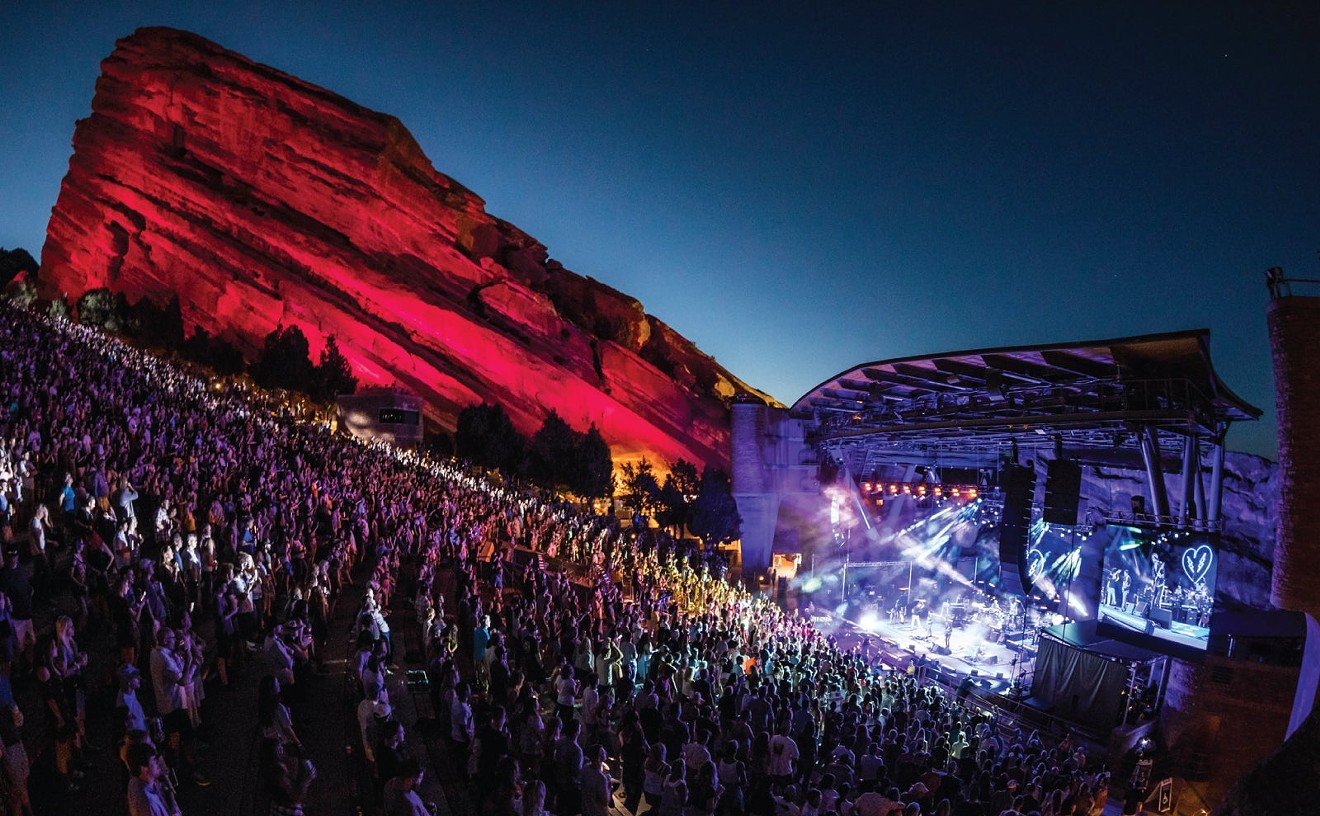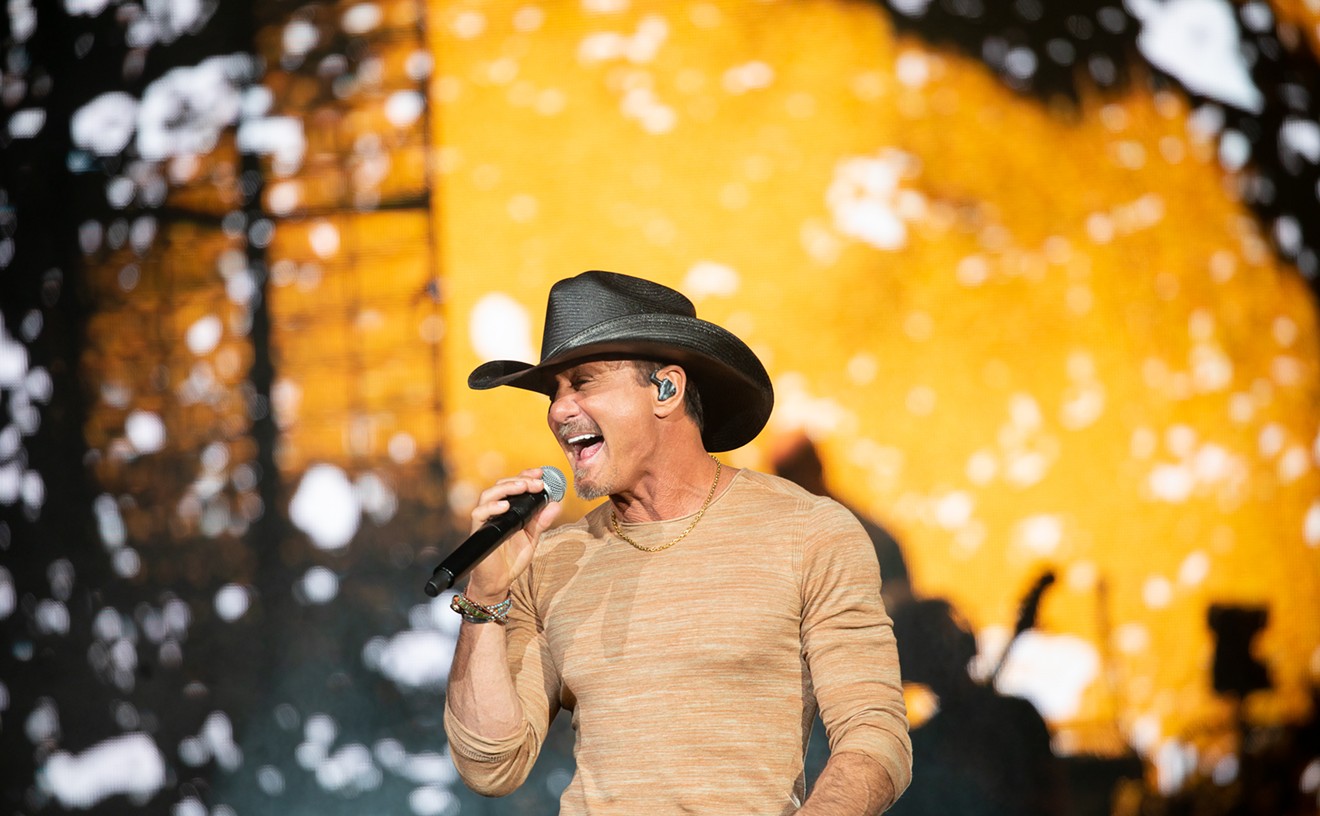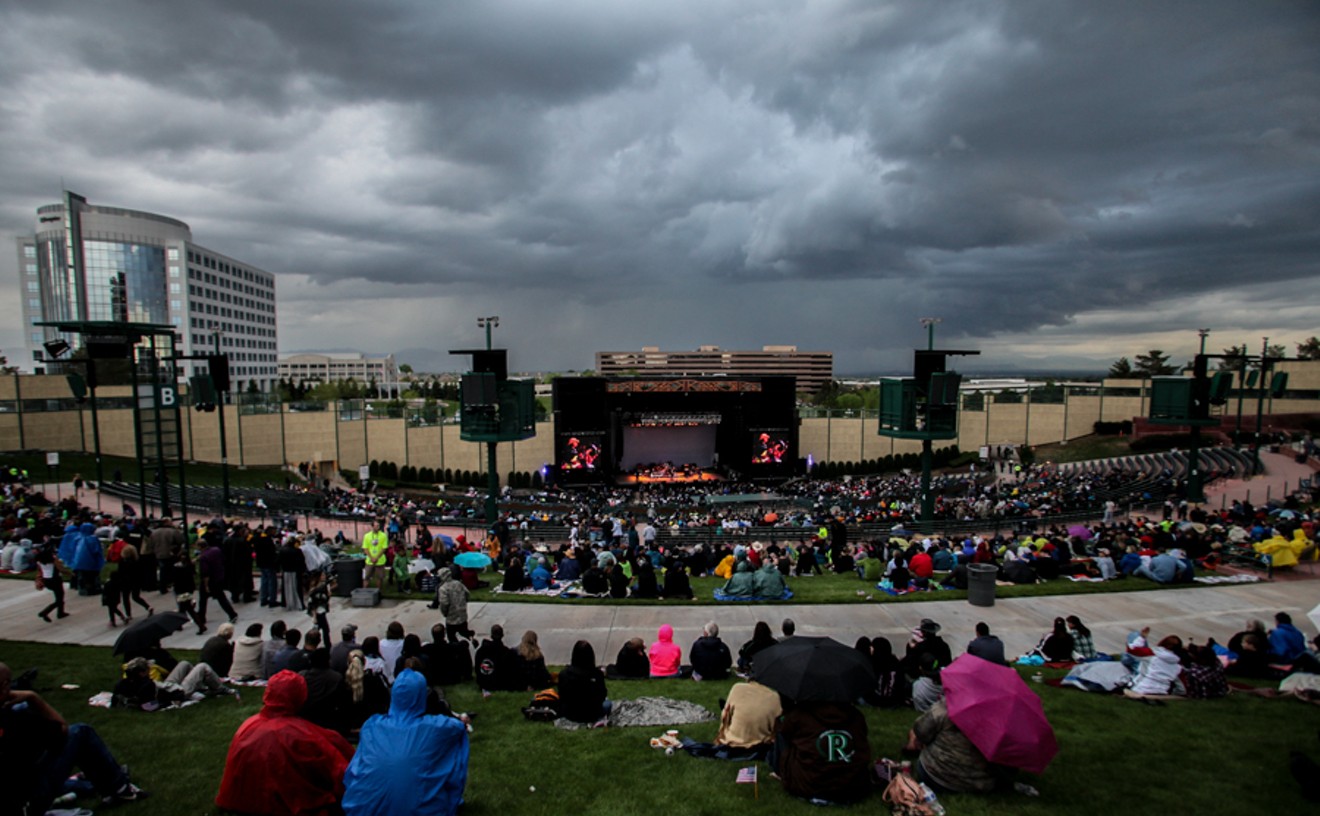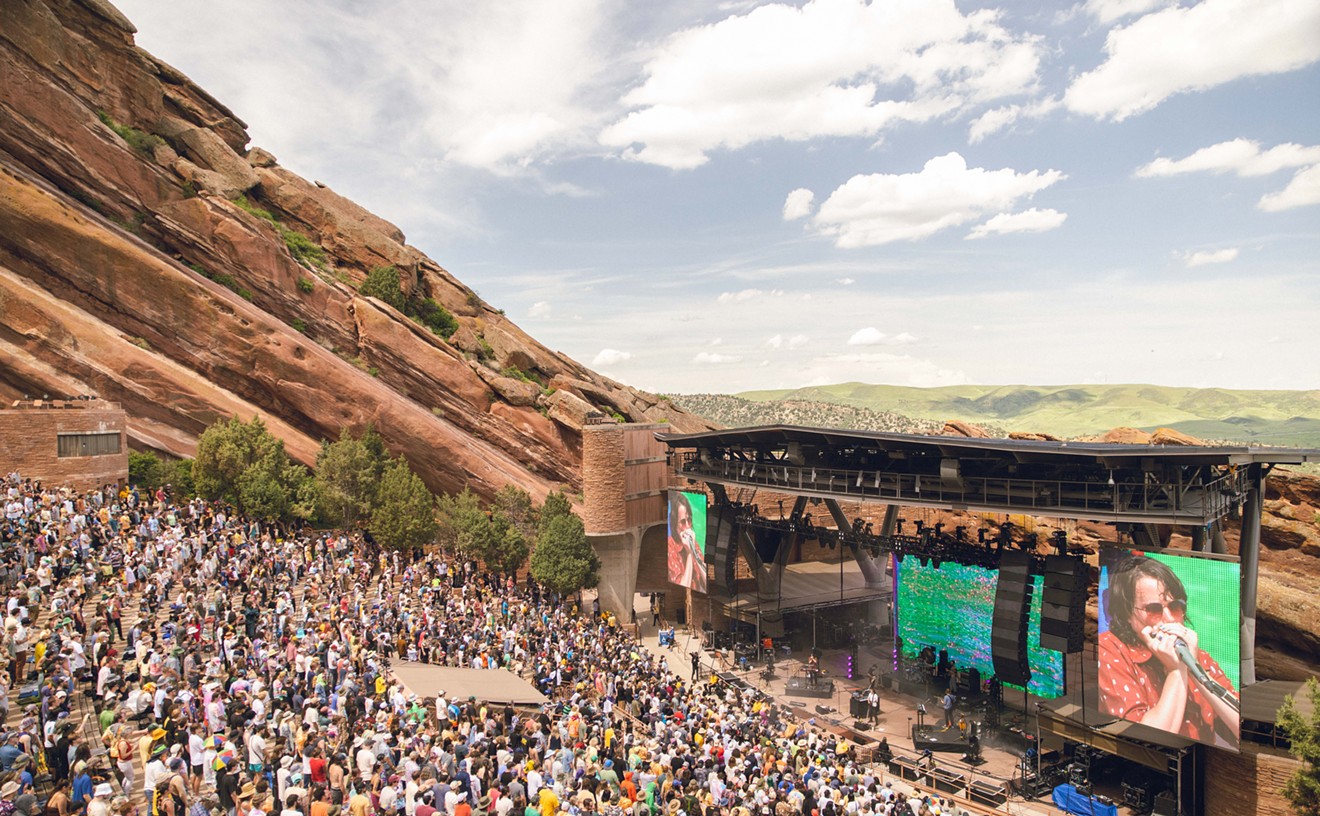For nearly thirty years, Mickey Melchiondo's been making music under a moniker. As Dean Ween, one of the eponymous creative forces behind Ween, Melchiondo's carved out an ambitious musical niche since founding the band with Aaron Freeman - aka Gene Ween - in the 1980s. In advance of Ween's Halloween show at 1STBANK this weekend, we caught up with Melchiando to talk about the band's recent touring schedule, fundamental changes to the recording industry and the pot-smoking hippies in Colorado who make Denver and Boulder a constant stop for Ween.
The last time Colorado fans saw the band was at the Red Rocks show last September. Can you give us a quick rundown of what the band has been up to during the past year?
Mickey Melchiondo: It's been all touring. This year was pretty much just a touring year for us. Right now we're moving out of our one studio into a new studio so we can record another record. This year was just about doing shows. We've written some songs, but really haven't started on a record yet. That's kind of our goal for the winter.
Was that a definite goal you guys have had in mind since last year?
I guess. It's something that we've never done before. Ween is really good about not overplaying. As a matter of fact, we just played in New York for the first time [this year]. We live, like, sixty miles from New York, and we play there like every four or five years. It's the same with Philadelphia. It's like forty minutes away.
We're very conscious not to overplay anywhere. Denver and Boulder are the places I think that we've played more than any other place. We're almost there once a year, which really isn't that much. This year was the first time that we ever did this, touring without a record. It was OK for me -- once. It was okay for me this year, but I don't think I'll do it again.
Why not?
I'm just not comfortable with it. I like touring in support of a new record. It's funny because the industry has been changing in such a way. I always thought it should be the focus; the whole point is that you're out there touring to promote and try and sell copies of your new record. It's kind of almost turned itself around now, where the record is this vehicle so you can go out and tour, and make money that way.
People really aren't buying records, whether they're downloading it or just not buying CDs, you know. It's just really dropped off. It's something that I think we're adjusting to. I'm not very comfortable with it, personally.
I always enjoyed the record making side of being in a band. I've always thought that Ween on vinyl or on CD and Ween live were two completely different entities, two different experiences that sort of supplemented and complemented one another. And I have to remember that [laughs]. I have to keep telling myself that.
For me -- not to sound like an old man or something, but I just turned forty last weekend. Looking back, I figured at this point in our career we'd probably not be touring very much, that we would just be making records. Well, the rules have all changed in the past five years. Nobody really knows where things are going. Radiohead tried to give away their record and pay whatever you think it's worth. There's this and that. Prince tried another way. A lot of bands just do the same old thing.
How has the changing nature of industry impacted Ween specifically?
The days of Elektra Records giving us $200,000 for a video are fucking over. We can make eight records with that money now. It's something that I think we're just trying to get our heads around right now. I didn't realize it when our last record came out.
To go further into it, I'm always afraid that Ween -- well, not afraid of it because I would never let it happen -- but I don't want Ween to become an oldies [act]. I don't want to go out and play, like the Violent Femmes, who I love, but they're just out there basically touring on the merit of what you've already done. There's probably a word for that. We did it once this year. We toured without a record, but I'm not very comfortable with it, so we'll be making a record.
What is it about Denver and Boulder that draws you guys more frequently than other cities?
They're two of the biggest touring towns in the world.
Is it just a Ween fanbase?
It's pot-smoking hippies. [Laughs] Honestly, it's a very liberal, progressive, artsy community that's rich in marijuana smokers. We're big in Chicago, too.
When La Cucaracha came out in 2007, you complained about how quickly it got leaked online before the official release.
That was a heartbreaker for me, not to sound like a pussy. But I never saw that coming, which is totally naive because that's what happens now. It's another thing you have to figure out. The typical way that things go down is that you make your record, the record company gets a copy of it and they send it to journalists two months out in advance, you know. You can't do that shit anymore. It's going to take it about five seconds to get on the web; people will be racing to put it up there. It's frustrating.
So has it forced you to take a different approach?
I think we're kind of old-school. I know for a fact that Aaron -- I can speak for him -- and I are both more comfortable with the typical model that we always have worked within, where a record company gives you money, you make the record, you give it to them and it's their job to sell it. It's out of your hands. I don't want to pioneer; we don't have the energy to do something like Radiohead. I don't want to own a record company. I don't want to be that involved beyond just making the music.
Will it go in the opposite direction for the next record? Do you think you'll try to keep it even more safely guarded?
Yeah, yeah, definitely. I don't think we would make that mistake again. I don't want to trailblaze. I don't want to start a music subscription service. I'll leave that to someone with the energy to focus on all of that nonsense. I want to do the parts of being in a band that are fun: recording, playing concerts, writing songs, playing guitar. I talk to our manager enough every day without having to bring on all those other decisions. You would have to be involved at every step to present it in a way that's consistent with the rest of what your fans are used to.
If you're Prince, then the rules don't apply. I think Ween has carved out its own niche, but if you're Prince and you've had records that have sold five million copies before, it's a lot different from Ween. We're used to selling 100,000 records. We take that hit a lot harder. We have less flexibility to be creative in a way that's still lucrative.
How has the creative process behind putting an album together evolved in the past twenty years?
Every record is the same, to be honest with you. We aren't going to work any differently than we did on The Mollusk or White Pepper or anything. Aaron and I will get together. We'll rent a house, we'll move our equipment in there, and we'll work on the record until it's done. We did White Pepper up in a house in Maine, not the recording of it, but the writing and the demos. The Mollusk was done down on the beach.
Whatever else has changed in the way the music industry is structured now, we're not going to change. We have a system that we're married to that works for us. It's kind of funny, because it's the same exact thing we did when we were sixteen in Ween. We still work the same way. It's only the two of us that are there with a tape recorder.
You've spoken a lot about how you and Aaron work together, but I'm curious about the rest of the band -- drummer Claude Coleman Jr., bassist Dave Dreiwitz and keyboardist Glenn McClelland: You've had the same band lineup for some time now. How are they involved?
Yeah, it's been about fifteen years with the five of us. They're definitely involved. I mean, White Pepper was a band record when we got into the studio. There are tracks on our records that we cut as a whole band, but I'm talking more about the writing end of the process.
That's just Aaron and I. I play the drums and the bass, he does the same. We kind of have to be alone for that part of it. Some tracks we cut as a band. On La Cucaracha, I know we did "Woman and Man" that way, "Your Party," "Bare Hands." There are always a handful of songs that are better like that.
White Pepper was really cool, because a live record came out that summer [in 1999], and we went out on tour. We played all the stuff from White Pepper on that tour, then we came home and we went into the studio and cut the album.
I think that's why I love that record: We went in and we had our thing completely organized and together. We knew exactly what overdubs we were going to do. We cut the whole record as a band. I think that record stands out for me because of that.
Elektra put out a live record, Painting the Town Brown. We toured that summer that that came out, playing all that stuff from White Pepper, every single night, "Bananas and Blow," "Exactly Where I'm At" and "Even If You Don't."
How have some of the older tunes from the early albums like GodWeenSatan and The Pod evolved in a live setting during the past two decades?
It's pretty funny. I don't ever hear Ween records. Like ever. Usually after the mastering session, that's the last time I hear them. We have a song on Pure Guava called "Big Jilm." It's written about a guy worked for my father, this old black guy who had a car detailing service when I was growing up, this nice old guy, Jim Lemons.
He just died, so we posted something online saying, "Rest in peace, Jim Lemons. He was the inspiration for 'Big Jim'" with his picture. One of our fans responded to it and put up a YouTube video of a version of "Big Jim" from Pure Guava. I think it's been like seventeen years since I heard it. It took me a second to even realize what I was listening to. It's like no similarities at all to the live versions.
So is that a process that just happens organically?
Yeah. As I said, it used to be that the live thing and the album thing were two completely different experiences. Gradually, the focus has become more on the live thing. When La Cucaracha came out, within two weeks we'd played to more people than had bought the record. Like, how does that add up? One out of every thousand of these people is buying our new record and coming to see us? But they know all the songs and the words?
Speaking of the fans, how has the relationship changed over the years? Are you guys still as connected?
I think you can write to every single guy in the band from our website. I moved away from it a little bit because I started our website and I actually ran the server out of my house for awhile in the mid to late '90s. It got to the point where now that everybody has high-speed internet in their house and just the growth of the web, it became too much responsibility for me to keep up with.
It was like, now we're selling shirts and there's the sale base that's up there. All the shit needs to be updated and I'm fishing for four days ... Finally, it took me years to be whittled down. I held on to it, I was very protective of it. I used to field every single e-mail from the website. When it started to get to the point where it was, "I ordered a T-shirt and you sent me the wrong size," I was like all right, I better hand this off. But we're very, very in touch with our fans. I get e-mails every day. Shit, my phone number's on my fishing website.
Does that ever create problems with over obsessive fans?
We've had a lot of that kind of stuff happen, but nothing scary, no Mark David Chapmans. I can put up with most of the kids; young kids road tripping, you know, thinking it's a good idea to come to New Hope.
You guys have stayed in New Hope since the beginning. How has it been balancing life in a smaller town with working a day job as a rock musician?
I don't have anything to compare it to -- it's great. Where we live is awesome, it's not the sticks. It's a very artsy, creative little town. There are a lot of famous musicians and painters and sculptors that live here and that have lived here. James Michner is from here, Leon Redbone lives here. It's a beautiful town. We're forty minutes from Philly, 67 miles to New York City. We're not hicks [laughs]. But we were never city people, neither of us. I think that staying here has helped Ween, it's had a lot to do with how Ween has been shaped over the years.
We're not touring now like we used to. We're not gone eight to ten weeks like we were in the early days. This summer, we basically toured from Thursday to Monday every two weeks, and did as many shows as we would have had we done two or three six-week runs. It's a lot easier that way. If you've been doing it long enough, you have to find how much you're comfortable with and how often. There's no getting around touring.
Have there been any parts of the songwriting process or the live approach that have changed since you and Aaron were in junior high?
No, honest to god. Everybody finds their method. I guess it can change. I don't know enough people in bands, but I've gotten to observe firsthand how other people do things. It's different for everybody. I think typically if you had a four- or five-piece band you go in and you do demos. Because we're not structured like that -- it's just the two of us. Most of the time, somebody brings in a song title. That's a big way that we write. Very rarely is it a riff. A lot of times, we get together and we just turn all the equipment on and just start experimenting.
The best stuff happens really, really fast and I know Aaron would tell you the same thing, the best songs that we do is when he and I collaborate on them. I think our best songs are written by both of us. We both write a lot on our own, but all my favorite Ween tunes were written by both of us; they were done in like forty minutes.
That whole Mollusk record, that's my favorite Ween record and I think it always will be. He and I went down to the shore. We didn't have anything written and the first seven songs that we wrote ended up on that record. We were writing like one or two songs a day, the first week or two there. When we drove home, the best parts had been written and recorded. It just happened really, really fast.
There's a lot of stuff on that Shinola record that's from The Mollusk. We didn't tell people what is from what record. We weren't allowed to because of Elektra records. If you write a song for a record and it doesn't make it, in a traditional model, the record company still owns it. But because we never had any contact at all with them, they didn't know what the fuck we were doing. [Laughs].
There's a definite feel on The Mollusk, a sound that goes back to old Irish drinking songs and sea shanties. Did that have a lot to do with the setting of the recording sessions?
Yeah, it was definitely because of the setting. We had talked about that forever and ever and ever. Since we started the band, we always said we have to go down to the shore in the winter when there's nobody down there and all the traffic lights are turned off. It worked. That was the first time we went down and did it. We went back and did it for Quebec and a couple of other records, it was very productive also. There's something about that environment -- it's total isolation. You can always just stop and take a walk along the beach.
Do you think you'll opt for that environment on the next record?
No, not unless it goes later than next year. It's only good down there through October and November. When you get into the real winter down there, it becomes suicidal, like shooting heroin kind of shit. It's so dark and evil it's like beyond isolation. Nothing is open, no restaurants -- you feel like you're the last man on earth. That might be fun for two days.
Can you talk about the idea you had for the Halloween show at the 1STBANK Center in Denver and why it didn't end up working out?
I was sitting at home with my son, my wife was out. They had the Guinness Book of World Records at his school and he was telling me about it; I said let's see if they have a website. They had a public gatherings tab ... They had the largest gathering of people dressed as gorillas. It was in London and it was like 1,000. It all just clicked for me. I knew that we had a Halloween show coming up in Denver, and I knew that we were one of the few organizations in the whole world that could easily break that, maybe quintuple it. It was perfect.
I told Aaron and our manager. Everyone was psyched about it; we set the process in motion. To apply for a Guinness record, it takes them like a year unless you pay $750. That's how they know you're serious. They got back to us, we had everything all lined out. Then they called us and said, "Just so you know the record on the website has since been broken ... It was broken on Halloween last year in Denver, Colorado by this organization doing a thing against animal research."
I was like, Jesus, what are the chances of that? The same town on the same day? It just added to it, we said we'll just bust that record open this year. They didn't beat the record by a lot. Guinness called back two days later and said, "Just so you know, the same organization is doing it again this year." It just completely killed our buzz. They're doing their thing for charity pretty much on the same night in the same town. It's just too scummy. Maybe there's another we can break, but the air had gone out of the balloon.
Do you know anything about the venue?
MM: I don't. I thought we were playing the Fillmore, until I did another interview. I don't know anything about it. My friend just played there. He said it's awesome.
Do you see the show as having any special significance for the band?
We just did Central Park. That was the one I set in my head as the milestone show, because there's just so much pressure associated with it. It's a hometown gig for us. I'm really, truly excited for the Halloween show in Denver. There's no way it can't be fun. [Laughs].
We've played Halloween a million times, obviously, since we're called Ween. We always get offered Halloween gigs. I know what to expect. We'll get in costume and you get away with a lot more than normal. It won't be a gorilla costume, unfortunately. I won't be a gorilla staring out at 5,000 other gorillas, which was my fantasy. We've already done chicken suits. I've got to come up with something soon.
Do you want to give any hints about your costumes?
No, I can't tell you.
Ween, 8 p.m. Sunday, October 31, 1STBANK Center, 11450 Broomfield Lane, $38.50-$45.00, 866-461-6556.










